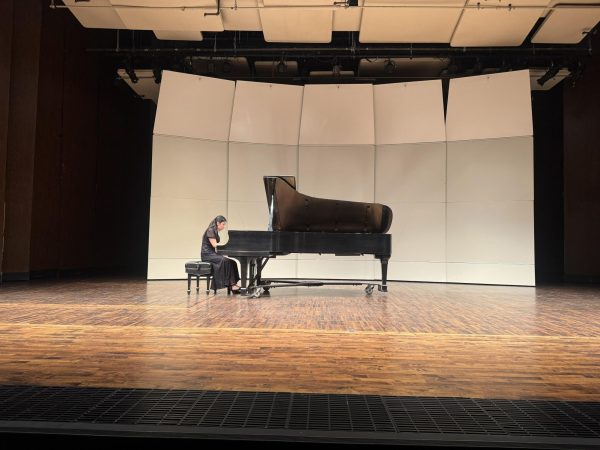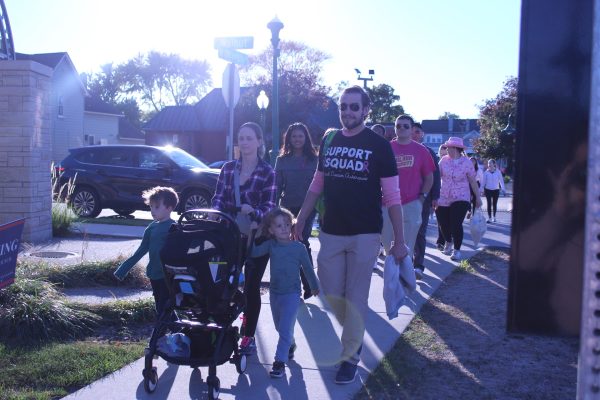Panel held on undocumented immigrants and their access to higher education
A small crowd of people came to listen to a panel discussion about undocumented immigrants and education on Oct. 1.
The event took place in Gold Room B in the Oakland Center. It was part of the ongoing Hispanic Celebration Month at Oakland University.
The panel was comprised of Raquel Anderson from Global Detroit, Josue Tellez from Michigan Dreamers for Tuition Equality and Adonis Flores from Michigan United.
Garret Garcia from Centro Multicultural La Familia moderated the event. Each panelist had experience in dealing or working with education struggles due to undocumented status.
One of the first discussion points dealt with the terms “undocumented immigrant” and “illegal immigrant.” Flores, who said he came to the United States with his family when he was eight, started by speaking about other children who have done the same.
“Children, when they arrive to this country, they have no choice in coming to this country,” Flores said. “So when a lot of people are accusing children of breaking the law, it doesn’t make much sense that they get the same punishment as adults, right?”
He also said that “illegal immigrant” is inaccurate because it tends to dispel the idea that undocumented people can eventually become legal inhabitants.
“If you drive and you pass a stop sign, it doesn’t make you an illegal driver for the rest of your life,” Flores said. “So, if you are an immigrant and came to the United States with no documents, that doesn’t make you an illegal immigrant for the rest of your life.”
There are even technical problems with the term “undocumented,” he said, since many immigrants come with documentation from their home country.
Both Flores and Tellez talked about their previous lobbying for the DREAM Act, or Development, Education and Relief for Alien Minors, which would have given such minors a way to access higher education and a path to citizenship. However, the act did not pass when it reached Congress in 2010.
The panel then brought up DACA, or Deferred Action for Childhood Arrivals. Since 2012, this federal policy allows certain undocumented individuals who came to America as minors to apply for a temporary stay from removal, as well as work authorization. It does not grant thhem legal status, though. It was mentioned that there are about 4,500 individuals in Michigan who are under DACA.
The conversation then moved toward higher education for undocumented individuals. Garcia made the point that, for international students, college tuition is usually double or triple in cost per credit hour than for local residents. Both Flores and Tellez said that they faced this price increase at Oakland Community College due to their status.
“If you don’t prove that you’re a U.S. citizen, or don’t have a status at all, they automatically place you in the international category,” Tellez said of the OCC policy. “So that means you pay three times more than a regular resident pays.”
Flores and Tellez said that they worked full time while taking one class a semester.
In paying for college, “It’s difficult when you have a job that is a minimal-wage-paid job,” Tellez said.
He also explained that it is almost impossible for student loans to be granted to undocumented people since they usually have no credit history to provide to banks.
Based off of a change in tuition policy at the University of Michigan following protests by DACA students, Tellez decided to try the same at OCC. He and a group of others started a social media campaign to get tuition equality, which eventually led to discussions with OCC executives and a change in tuition policy.
Tellez, Flores and Anderson are now working to bring tuition equality for undocumented immigrants of all statuses to all colleges and universities in Michigan.
“These are young people that are going to waste,” Anderson said. “Everybody benefits when a person is educated and can see their own full potential, whatever that may be.”
Afterwards, Garcia, who helped put the panel together for Hispanic Celebration Month, said that he knew the panelists from working with the Hispanic community as an attorney in Pontiac. He also said that he has retained ties with OU since graduating from the university.
“I was on the committee to plan for this month,” Garcia said. “And I said this would be an event which I could kind of coordinate, since I thought it would be interesting for the people. And so I arranged to have these people show up.”




